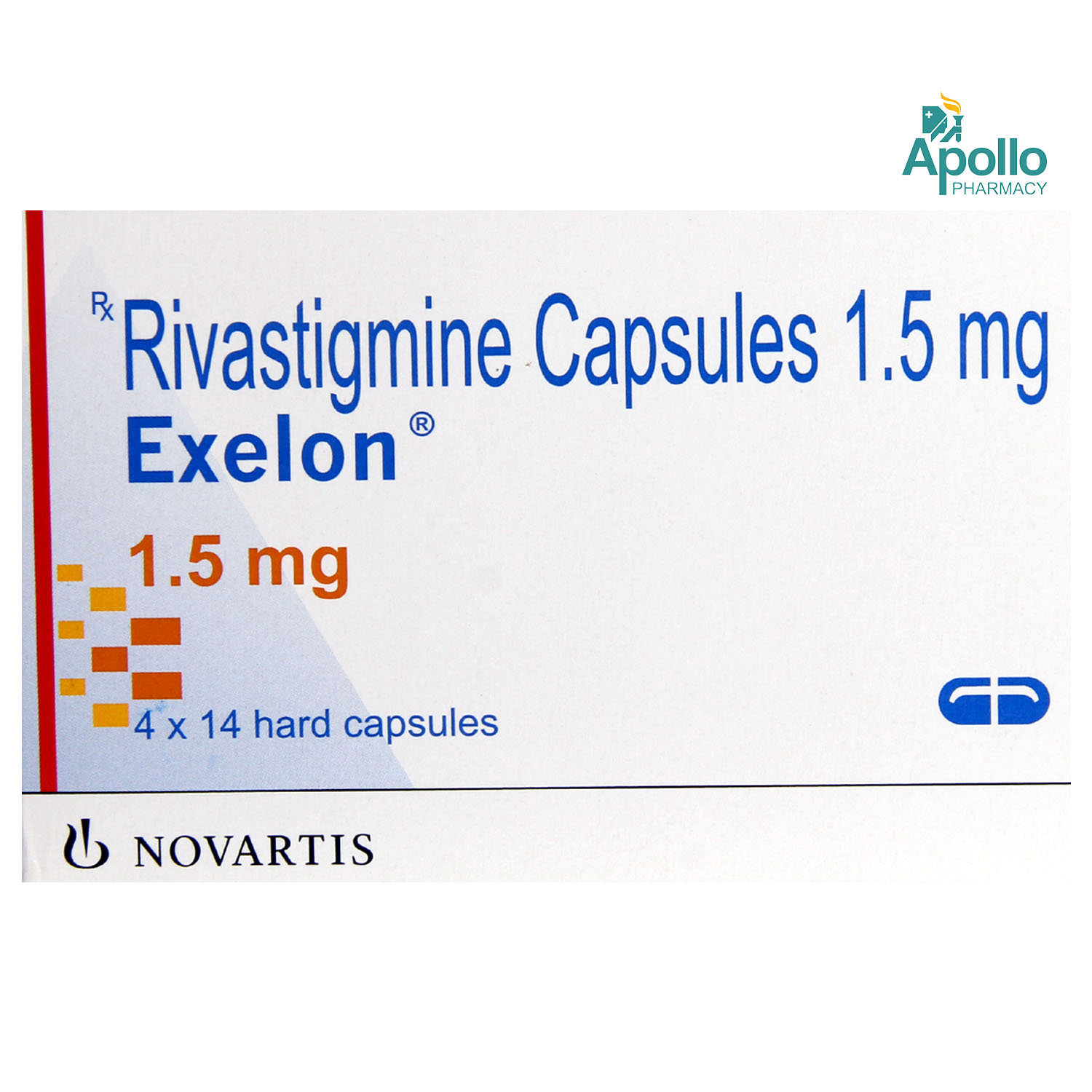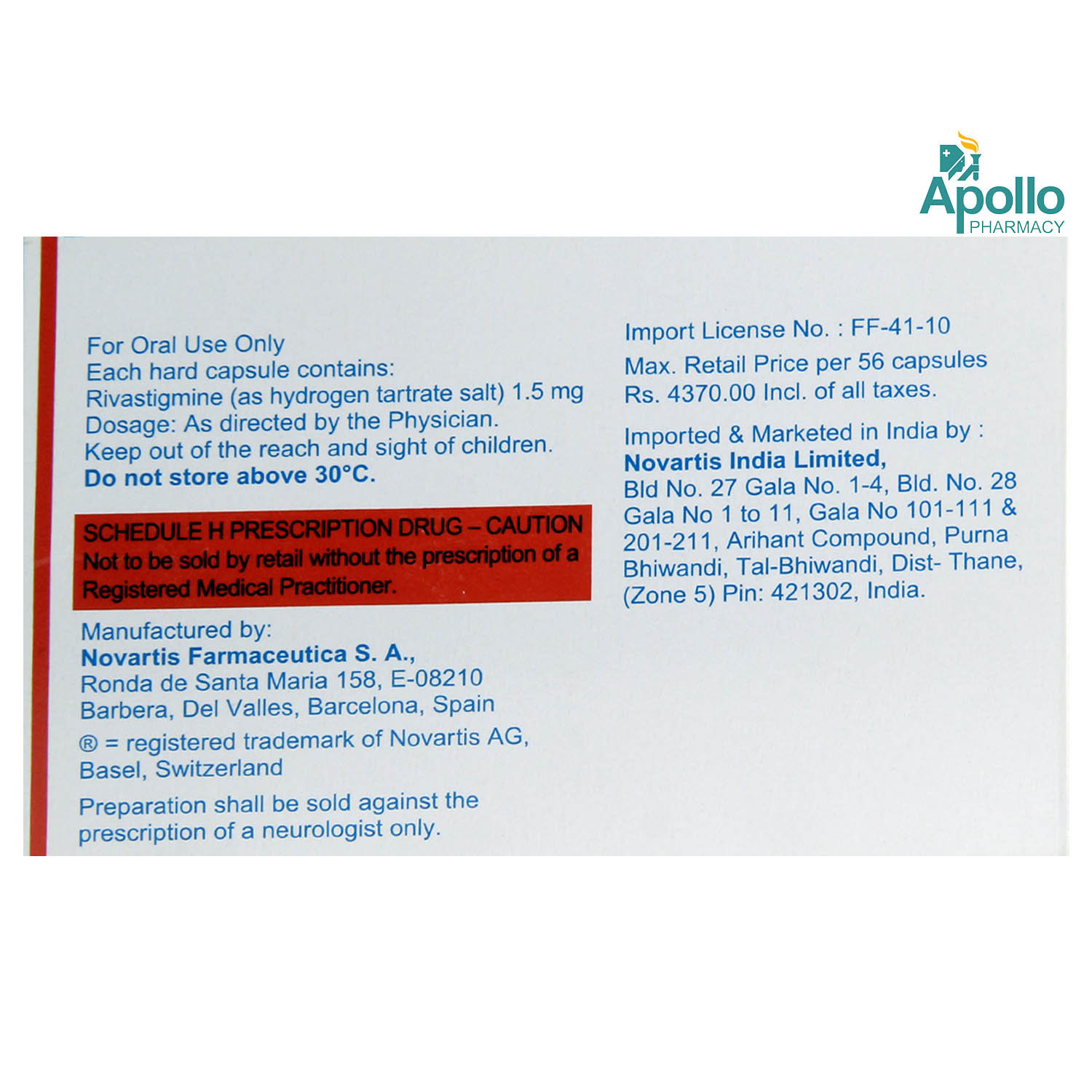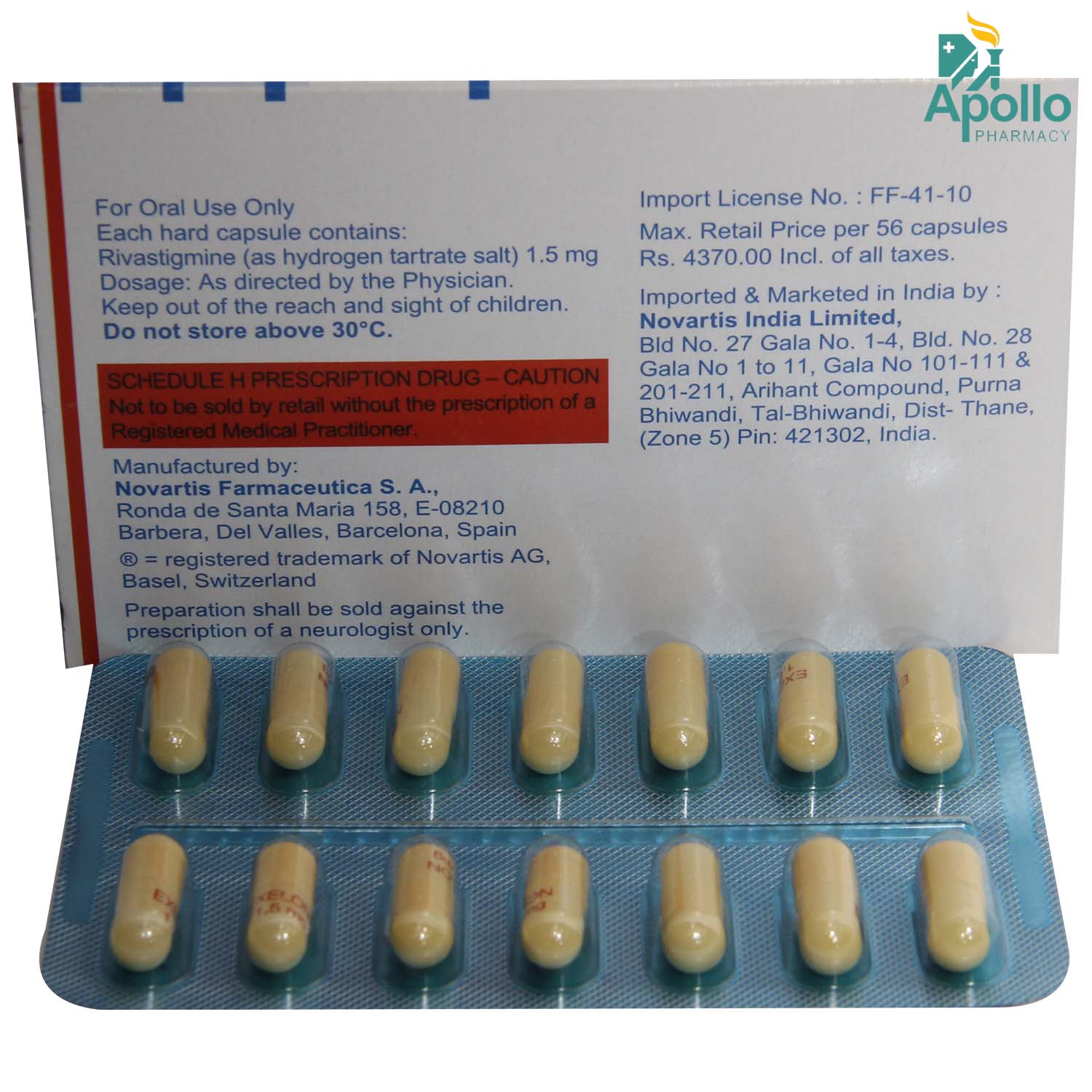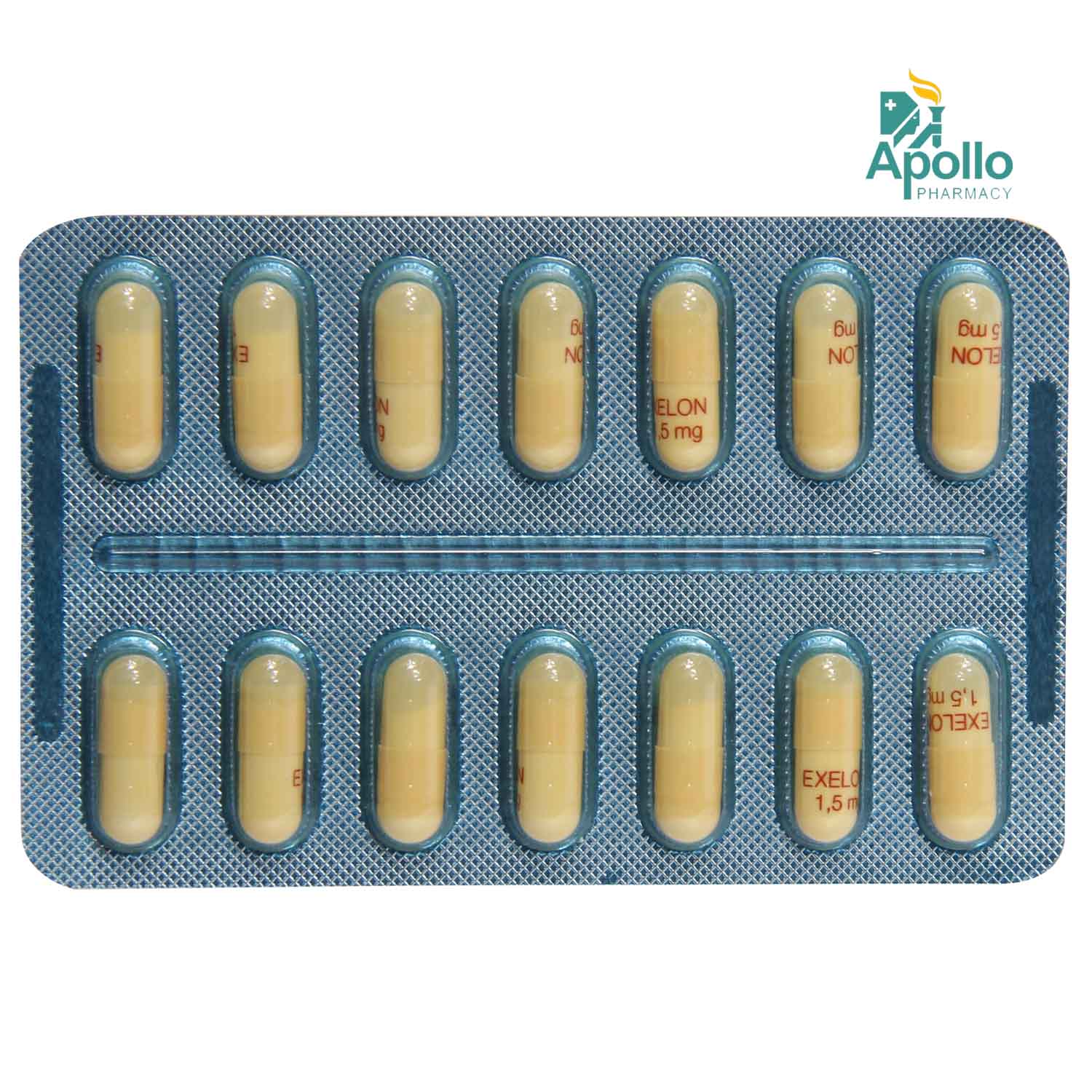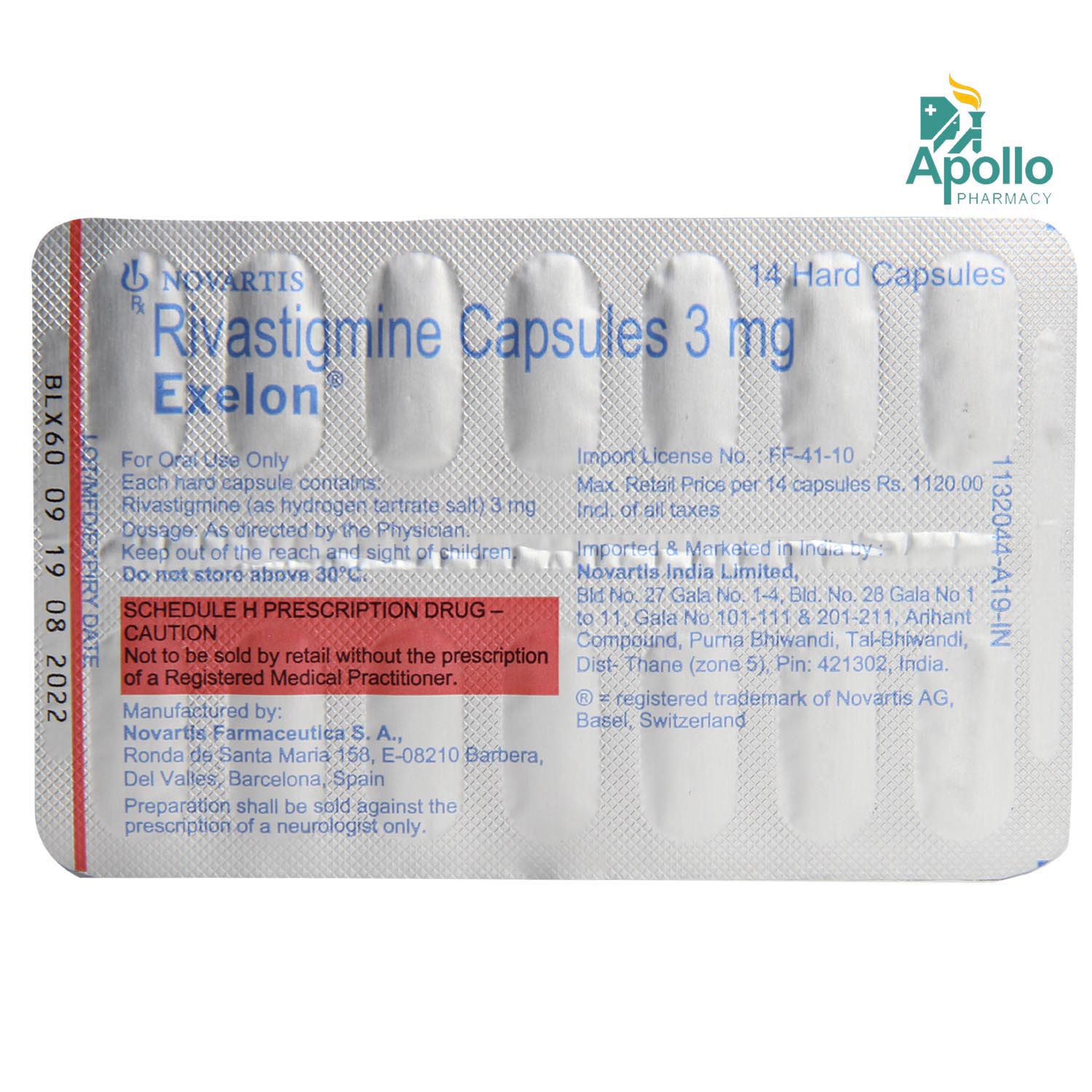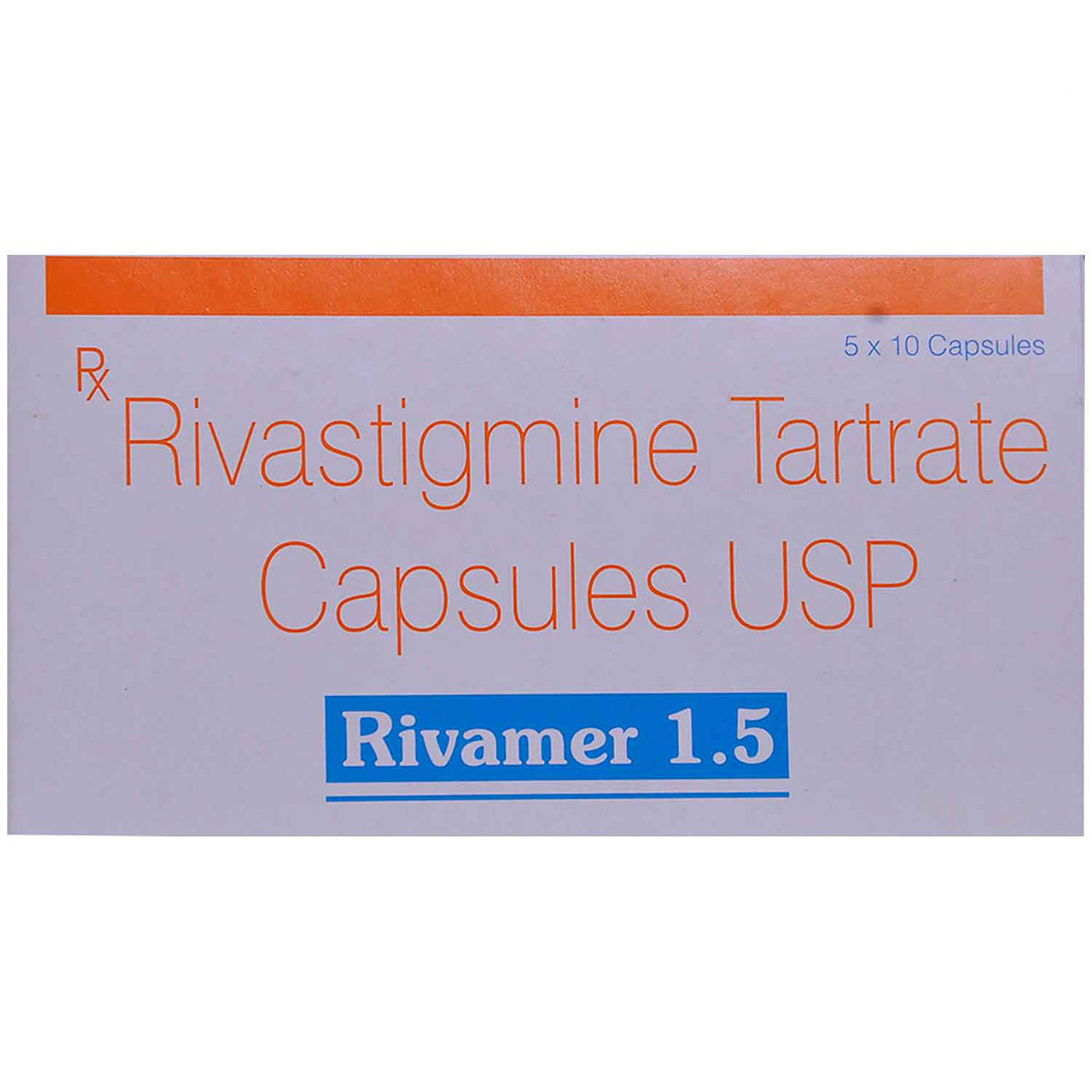Exelon 1.5 mg Capsule 14's
MRP ₹744.5
(Inclusive of all Taxes)
₹111.7 Cashback (15%)
Provide Delivery Location
Online payment accepted
 Prescription drug
Prescription drugWhats That
Composition :
Manufacturer/Marketer :
Consume Type :
Expires on or after :
Return Policy :
NPPA :
About Exelon 1.5 mg Capsule
Exelon 1.5 mg Capsule belongs to a group of medicines called 'anti-dementia agents' used to treat mild to moderate dementia caused by Alzheimer's or Parkinson's disease. Alzheimer's disease is a neurological disorder, which causes dementia (memory loss) and slowly destroys the ability to think, learn, communicate and handling daily activities. Parkinson's disease is a central nervous system disorder that affects movement leading to shaking, stiffness and difficulty with walking, balance and coordination.
Exelon 1.5 mg Capsule contains 'Rivastigmine' that belongs to the class of 'Acetylcholinesterase Inhibitors'. Rivastigmine increases acetylcholine (a brain chemical) levels allowing the nerve cells to communicate. It restores the balance of neurotransmitters and improves mental function, such as memory and thinking. Neurotransmitters are chemical messengers that transmit the message from one nerve cell to another nerve cell, muscle cell or a gland cell.
Your doctor will decide the dose and duration based on the severity of your disease. Common side effects of Exelon 1.5 mg Capsule include nausea, vomiting, upset stomach, dizziness, drowsiness, shakiness (tremor), weakness and loss of appetite. These side effects are not familiar to everyone and vary individually. If you notice any side effects that are not manageable, please consult your doctor.
Let your doctor know if you use any prescription and non-prescription medications you are taking, including other vitamins, before starting Exelon 1.5 mg Capsule . Please tell your doctor if you are allergic to any medicines. Inform your doctor beforehand if you have a history of liver or kidney diseases, breathing problems (asthma, chronic obstructive pulmonary disease (COPD)), stomach/intestinal problems (ulcers, bleeding), heart diseases (sick sinus syndrome and other conduction disorders), fainting, fits, urination problems or enlarged prostate. It is essential to let your doctor know if you are pregnant, planning to conceive or a breastfeeding mother. Avoid consuming alcohol along with Exelon 1.5 mg Capsule as it can make you dizzy or drowsy.
Uses of Exelon 1.5 mg Capsule
Directions for Use
Key Benefits
Exelon 1.5 mg Capsule treats mild to moderate dementia caused by Alzheimer's and Parkinson's diseases. It contains 'Rivastigmine', an acetylcholinesterase inhibitor. Rivastigmine increases acetylcholine (a brain chemical) levels in the central nervous system involved in transmitting nerve signals that play an essential role in memory. Exelon 1.5 mg Capsule is not a cure for Alzheimer's and Parkinson's diseases, but improves memory, thinking, awareness and the ability to perform daily functions.
Storage
- Inform your doctor about the nausea and discuss possible alternatives to the medication or adjustments to the dosage.
- Divide your daily food intake into smaller, more frequent meals to reduce nausea.
- Opt for bland, easily digestible foods like crackers, toast, plain rice, bananas, and applesauce.
- Avoid certain foods that can trigger nausea, such as fatty, greasy, spicy, and smelly foods.
- Drink plenty of fluids, such as water, clear broth, or electrolyte-rich beverages like coconut water or sports drinks.
- Use ginger (tea, ale, or candies) to help relieve nausea.
- Get adequate rest and also avoid strenuous activities that can worsen nausea.
- Talk to your doctor about taking anti-nausea medication if your nausea is severe.
- Record when your nausea occurs, what triggers it, and what provides relief to help you identify patterns and manage your symptoms more effectively.
- Preventing Vomiting (Before it Happens)
- Take medication exactly as prescribed by your doctor. This can help minimize side effects, including vomiting.
- Having a small meal before taking your medication can help reduce nausea and vomiting.
- Talk to your doctor about taking anti-nausea medication along with your prescribed medication.
- Managing Vomiting (If it Happens)
- Try taking ginger in the form of tea, ale, or candy to help alleviate nausea and vomiting.
- What to Do if Vomiting Persists
- Consult your doctor if vomiting continues or worsens, consult the doctor for guidance on adjusting your medication or additional treatment.
- Inform your doctor about dizziness symptoms. They may adjust your medication regimen or prescribe additional medications to manage symptoms.
- Follow your doctor's instructions for taking medication, and take it at the same time every day to minimize dizziness.
- When standing up, do so slowly and carefully to avoid sudden dizziness.
- Avoid making sudden movements, such as turning or bending quickly, which can exacerbate dizziness.
- Drink plenty of water throughout the day to stay hydrated and help alleviate dizziness symptoms.
- If you're feeling dizzy, sit or lie down and rest until the dizziness passes.
- Track when dizziness occurs and any factors that may trigger it, and share this information with your doctor to help manage symptoms.
- Inform Your Doctor: Notify your doctor immediately about your diarrhoea symptoms. This allows them to adjust your medication or provide guidance on managing side effects.
- Stay Hydrated: Drink plenty of fluids to replace lost water and electrolytes. Choose water, clear broth, and electrolyte-rich drinks. Avoid carbonated or caffeinated beverages to effectively rehydrate your body.
- Follow a Bland Diet: Eat easy-to-digest foods to help firm up your stool and settle your stomach. Try incorporating bananas, rice, applesauce, toast, plain crackers, and boiled vegetables into your diet.
- Avoid Trigger Foods: Steer clear of foods that can worsen diarrhoea, such as spicy, fatty, or greasy foods, high-fibre foods, and dairy products (especially if you're lactose intolerant).
- Practice Good Hygiene: Maintain good hygiene to prevent the spread of infection. To stay healthy, wash your hands frequently, clean and disinfect surfaces regularly, and avoid exchanging personal belongings with others.
- Take Anti-Diarrheal Medications: If your doctor advises, anti-diarrheal medications such as loperamide might help manage diarrhoea symptoms. Always follow your doctor's directions.
- Keep track of your diarrhoea symptoms. If they don't get better or worse or are accompanied by severe stomach pain, blood, or dehydration signs (like extreme thirst or dark urine), seek medical help.
- Hydrate your body: Drink enough water to prevent dehydration and headaches.
- Calm Your Mind: Deep breathing and meditation can help you relax and relieve stress.
- Rest and Recharge: Sleep for 7-8 hours to reduce headache triggers.
- Take rest: lie down in a quiet, dark environment.
- Cold or warm compresses can help reduce tension.
- Stay Upright: Maintain good posture to keep symptoms from getting worse.
- To treat headaches naturally, try acupuncture or massage therapy.
- Over-the-counter pain relievers include acetaminophen and ibuprofen.
- Prescription Assistance: Speak with your doctor about more substantial drug alternatives.
- Severe Headaches: Seek emergency medical assistance for sudden, severe headaches.
- Frequent Headaches: If you get reoccurring headaches, consult your doctor.
- Headaches with Symptoms: Seek medical attention if your headaches include fever, disorientation, or weakness.
- Drink water or other clear fluids.
- To prevent worsening of pain, limit intake of tea, coffee, or alcohol.
- Include bland foods like rice, toast, crackers, and rice in your diet.
- Avoid lying down immediately after eating as it may cause indigestion or heartburn.
- Avoid acidic and spicy food as it may cause indigestion.
Drug Warnings
Let your doctor know if you use any other medicines or supplements before using Exelon 1.5 mg Capsule . Brief your medical history if you have any liver or kidney diseases, breathing problems (asthma, chronic obstructive pulmonary disease (COPD)), stomach/intestinal problems (ulcers, bleeding), heart diseases (sick sinus syndrome and other conduction disorders), fainting, fits, urination problems and enlarged prostate. Please consult your doctor know if you are pregnant, planning to conceive or a breastfeeding mother. Avoid consuming alcohol along with Exelon 1.5 mg Capsule as it might lead to increased side effects. Do not drive or operate machinery as this medicine may cause dizziness and sleepiness. Exelon 1.5 mg Capsule is not recommended for children below 18 years as safety and effectiveness have not been established. Store this medicine below 25°C away from direct sunlight.
Drug-Drug Interactions
Drug-Drug Interactions
Login/Sign Up
Coadministration of Exelon 1.5 mg Capsule with propranolol can cause an abnormally slow heart rate and low blood pressure.
How to manage the interaction:
Although taking Propranolol together with Exelon 1.5 mg Capsule can possibly result in an interaction, they can be taken together if prescribed by your doctor. However, consult your doctor if you experience lightheadedness, dizziness, fainting, or irregular heartbeat. Do not discontinue any medicine without consulting a doctor.
Taking Exelon 1.5 mg Capsule and Metrizamide together may increase the risk of developing seizures (fits).
How to manage the interaction:
Although taking Exelon 1.5 mg Capsule and Metrizamide together can possibly result in an interaction, it can be taken if your doctor has advised it. However, if you experience any unusual symptoms like muscle spasms, lip smacking, chewing, puckering, frowning or scowling, tongue thrusting, teeth clenching, jaw twitching, blinking, eye-rolling, shaking or jerking of arms and legs, shaking of hands and legs, jitteriness, restlessness, pacing, and foot tapping, consult a doctor immediately. Do not discontinue any medications without consulting a doctor.
Talking bupropion and Exelon 1.5 mg Capsule together can increase risk of having seizures (fits).
How to manage the interaction:
Co-administration of bupropion along with Exelon 1.5 mg Capsule can lead to an interaction, it can be taken if recommended by a doctor. In case you experience any symptoms like muscle spasms or movements, lip smacking, chewing, puckering, frowning or scowling, tongue thrusting, teeth clenching, jaw twitching, blinking, eye-rolling, shaking or jerking of arms and legs, shaking of hands and legs, jitteriness, restlessness, pacing, and foot tapping, consult a doctor. Do not discontinue any medications without consulting a doctor.
Taking Tramadol with Exelon 1.5 mg Capsule can significantly increase the risk of seizures (fits).
How to manage the interaction:
Taking Exelon 1.5 mg Capsule with tramadol together can possibly result in an interaction, it can be taken if your doctor has advised it. However, if you experience any symptoms such as lip smacking, chewing, puckering, frowning or scowling, tongue thrusting, teeth clenching, jaw twitching, blinking, eye-rolling, shaking or jerking of arms and legs, shaking of hands and legs, jitteriness, restlessness, pacing, and foot tapping, contact a doctor immediately. Do not discontinue any medications without consulting a doctor.
Exelon 1.5 mg Capsule may occasionally cause excessively slow heart rate and low blood pressure, and using it with bisoprolol may increase that risk.
How to manage the interaction:
Although there may be an interaction, bisoprolol can be taken with Exelon 1.5 mg Capsule if prescribed by the doctor. Consult the prescriber if you develop headache, dizziness, lightheadedness, fainting, or irregular heart rate.
Drug-Food Interactions
Drug-Food Interactions
Login/Sign Up
Diet & Lifestyle Advise
- Maintain proper weight by following a healthy diet.
- Exercise regularly as it helps in less cognitive decline and brain volume loss.
- Avoid smoking and alcohol consumption.
- Try to avoid stress by practising meditation or yoga.
- Include fruits and vegetables in your diet as they contain anti-oxidants.
- Eat nutritious food as it helps in cognitive stimulation.
- Limit foods with high cholesterol and saturated fats.
- Cut down on sugar, salt and processed foods.
- Drink plenty of water.
- Follow a healthy lifestyle as it helps in improving overall health and possibly protects the brain.
Side Effects of Exelon 1.5 mg Capsule
- Nausea
- Vomiting
- Upset stomach
- Dizziness
- Drowsiness
- Shakiness (tremor)
- Weakness
- Loss of appetite
- Trouble passing urine
- Slow heartbeat
- Black, tarry or bloody stools
- Low mood (depression)
Habit Forming
Therapeutic Class
All Substitutes & Brand Comparisons
RX
Out of StockRivastina 1.5mg Capsule
Cortina Laboratories Pvt Ltd
₹72
(₹6.48 per unit)
87% CHEAPERRX
Out of StockVastmin 1.5mg Capsule
Lifecare Neuro Products Ltd
₹85
(₹7.65 per unit)
85% CHEAPERRX
Out of StockRivagold 1.5mg Capsule
Septalyst Lifesciences Pvt Ltd
₹97
(₹8.73 per unit)
83% CHEAPER
Author Details
We provide you with authentic, trustworthy and relevant information
Drug-Diseases Interactions
Drug-Diseases Interactions
Login/Sign Up
FAQs
Drug-Drug Interactions Checker List
- ASPIRIN
- IBUPROFEN
- NAPROXEN
- BENADRYL
- METOCLOPRAMIDE
- OXYBUTYNIN
- TOLTERODINE
- ATENOLOL
Special Advise
- Let your doctor know that you are taking Exelon 1.5 mg Capsule if you are undergoing any medical tests.
- It is advised to monitor your blood pressure and blood sugar levels regularly.
Disease/Condition Glossary
Alzheimer's disease: The disease is named after Dr Alois Alzheimer, who was the first to discover the disease. Alzheimer's disease is a neurological disorder that causes dementia (memory loss) and slowly destroys the ability to think, learn, communicate and eventually, the ability to handle daily activities. It is the most common cause of dementia (memory loss) in adults. Dementia is the loss of cognitive functioning, such as remembering, thinking and reasoning. The causes of this disease are abnormal functioning of brain cells which cause a disturbance in communication between them. The risk factors are age, family history and genetics of a person. Alzheimer's disease symptoms include memory loss, trouble with familiar tasks, difficulties with problem-solving, trouble with writing or talking, disorientation, problems with reasoning or judgment, mood and personality changes. In most people, the symptoms of Alzheimer's appear in their mid-60's.
Parkinson's disease: It is a central nervous system disorder that affects movement leading to shaking, stiffness and difficulty with walking, balance and coordination. This disease affects the nerve cells in the brain that produce dopamine (neurotransmitter). Parkinson's disease symptoms include dementia, muscle rigidity, tremors and changes in speech and gait (pattern of limb movement). This disease generally occurs in people aged 60 years and over. Risk factors of this disease include genetics, environmental triggers and certain toxins.

Have a query?
Alcohol
Safe if prescribed
It is advised to limit alcohol consumption while taking Exelon 1.5 mg Capsule . Alcohol intake, along with Exelon 1.5 mg Capsule , may cause increased dizziness and drowsiness. Please consult your doctor for more information.
Pregnancy
Consult your doctor
Exelon 1.5 mg Capsule should be used during pregnancy only if the benefit outweighs the risk. Please consult your doctor before taking Exelon 1.5 mg Capsule if you are pregnant or planning to conceive.
Breast Feeding
Consult your doctor
It is not known if Exelon 1.5 mg Capsule is excreted into the breast milk. Please consult your doctor before taking Exelon 1.5 mg Capsule if you are a breastfeeding mother.
Driving
Safe if prescribed
Exelon 1.5 mg Capsule may make you feel dizzy or drowsy. Do not drive if you experience any symptoms that affect your ability to drive or operate machinery.
Liver
Consult your doctor
Please consult your doctor before using Exelon 1.5 mg Capsule if you suffer from any liver impairment/liver disease.
Kidney
Consult your doctor
Please consult your doctor before using Exelon 1.5 mg Capsule if you suffer from any kidney impairment/kidney disease.
Children
Safe if prescribed
Exelon 1.5 mg Capsule is not recommended in people below 18 years of age.

